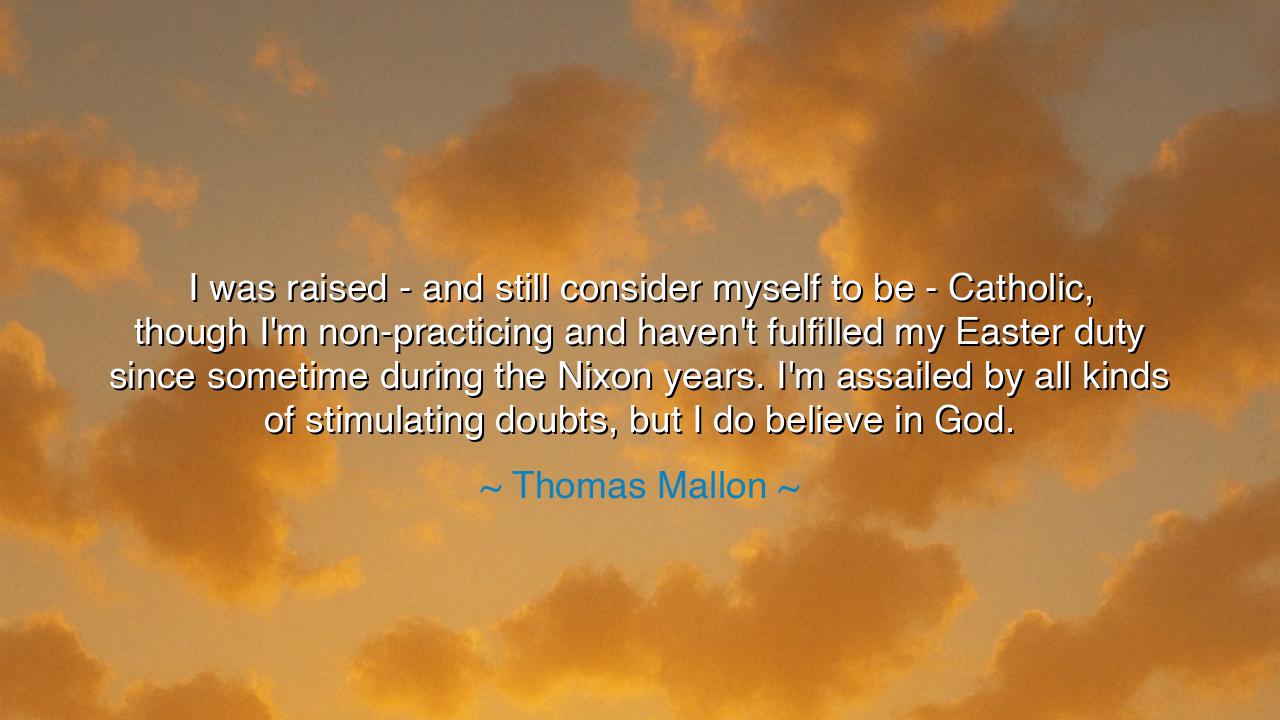
I was raised - and still consider myself to be - Catholic, though
I was raised - and still consider myself to be - Catholic, though I'm non-practicing and haven't fulfilled my Easter duty since sometime during the Nixon years. I'm assailed by all kinds of stimulating doubts, but I do believe in God.






When Thomas Mallon said, “I was raised — and still consider myself to be — Catholic, though I'm non-practicing and haven't fulfilled my Easter duty since sometime during the Nixon years. I'm assailed by all kinds of stimulating doubts, but I do believe in God,” he offered a confession not of doctrine, but of the soul’s complexity. Beneath these words lies a universal struggle — the tension between faith and doubt, between heritage and questioning. Mallon’s statement is not one of rebellion, but of spiritual honesty, the voice of a man standing between the altar of tradition and the wilderness of wonder. In this balance, he embodies the ancient truth that belief, when stripped of certainty, often grows deeper, humbler, and more human.
The origin of this reflection comes from Mallon’s background as both a novelist and essayist — a man deeply steeped in history, irony, and introspection. Raised in the Catholic faith, he absorbed its rhythms of ritual, its imagery of redemption, and its reverence for mystery. Yet like many intellectuals of the modern age, he also felt the pull of skepticism, the restless questioning of a mind unwilling to accept without understanding. His reference to not fulfilling his “Easter duty” — the traditional Catholic obligation to receive communion during Easter — is both literal and symbolic. It reveals a distance from the practice of faith, yet also a lingering reverence for its meaning. He has not renounced God; rather, he stands before the divine as a seeker who loves truth more than comfort.
In the style of the ancients, Mallon’s words could be seen as the confession of a pilgrim soul, one who walks not through deserts of denial but through forests of reflection. The ancients knew well that faith and doubt are not enemies, but companions. Socrates, who questioned the gods of Athens, did so not out of disbelief but out of reverence for truth. Saint Augustine, too, wrestled with uncertainty before finding his peace in faith. And even the great mystics of every age — from the desert fathers to the poets of the Renaissance — have whispered the same paradox: that to doubt is not to lose faith, but to refine it.
Mallon’s phrase, “stimulating doubts,” is key to his meaning. He does not call doubt destructive or corrosive, but stimulating — a spark that awakens the sleeping mind and renews the soul’s conversation with eternity. Such doubts do not sever belief; they give it depth. A faith untested by thought is fragile, but one that survives inquiry becomes resilient and luminous. To believe in God while admitting uncertainty is to embrace the mystery that faith was always meant to hold. It is to stand before the divine not as a conqueror of truth, but as a humble witness to it.
History offers us many such believers who lived in the tension Mallon describes. Blaise Pascal, the brilliant mathematician and philosopher, confessed his own wavering heart yet still wrote his Pensées in defense of faith. Mother Teresa, revered for her sanctity, wrote privately of her spiritual darkness, yet continued her work with unbroken love. Like Mallon, they reveal that faith is not the absence of struggle, but the courage to seek meaning through it. To be “assailed by doubts” is not a mark of failure, but a sign that one’s spirit is alive, alert, and deeply engaged with the divine mystery.
There is also tenderness in Mallon’s reflection — a recognition that belief can endure even when ritual fades. Though he calls himself “non-practicing,” his very language betrays devotion. He still calls himself Catholic; he still believes in God. The habits of faith, once learned in youth, do not vanish; they become part of one’s spiritual DNA. Even when neglected, they whisper quietly within the heart, reminding the soul of its origin. For faith is not only in the act of worship but also in the memory of holiness, the longing for meaning that persists when the candles of certainty go dark.
Thus, the lesson of Mallon’s confession is both tender and profound: faith and doubt are the twin pillars of a sincere spiritual life. To believe blindly is to risk complacency; to doubt endlessly is to risk despair. But to believe while doubting — to walk forward in the mist — is the mark of a mature soul. Let each person, then, cherish their questions, for they are the fires that keep belief alive. And let them remember that God, as Mallon reminds us, is not defeated by doubt, but revealed through it. For the divine does not demand perfection of faith — only the honesty of the seeker who dares to keep searching for light in the shadows.






AAdministratorAdministrator
Welcome, honored guests. Please leave a comment, we will respond soon